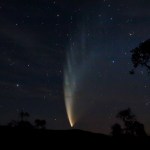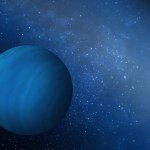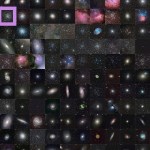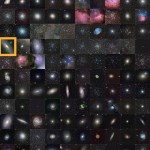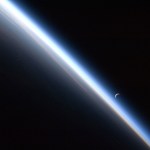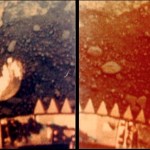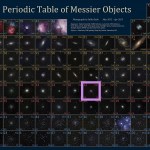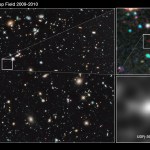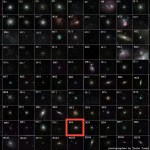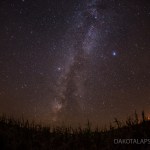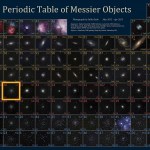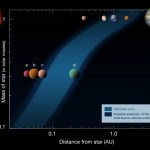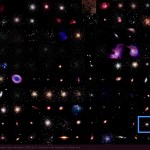Astronomy
"The great oak of Astronomy has been felled, and we are lost without its shadow." -Subrahmanyan Chandrasekhar, on the passing of Jan Oort
In our new semi-regular series, readers from all over the world (and in low-Earth orbit, too, because why not!) are invited to send in their questions and suggestions for a chance to have them answered here on this blog! Today, our question comes from Robert Meegan, who asks,
Have any Oort Cloud objects been detected in situ, as opposed to when they whipped through the inner solar system as comets? I would presume that any detection would…
"Like all animals, human beings have always taken what they want from nature. But we are the rogue species. We are unique in our ability to use resources on a scale and at a speed that our fellow species can't." -Edward Burtynsky
It's really a romantic notion when you think about it: the heavens, the Milky Way, is lined with hundreds of billions of stars, each with their own unique and varied solar systems.
Image credit: 湖北直行便 of AstroArts, via http://www.astroarts.jp/photo-gallery/photo/13870.html.
But beyond that -- in addition to the stars -- there are hundreds of billions of planets…
"Being born in a duck yard does not matter, if only you are hatched from a swan's egg." -Hans Christian Anderson
Welcome back for another Messier Monday! There are 110 deep-sky objects in the Messier catalogue, some of the most prominent night-sky fixtures, as seen from Earth, running the gamut of astronomical phenomena from within our galaxy and beyond. Each week, we pick a new one to place under the spotlight, examining what it is, what we know about it, and how to find it, among other spectacular facts.
Image credit: Rolando Ligustri, taken over many years, retrieved from http://www.…
"One sees qualities at a distance and defects at close range." -Victor Hugo
A couple of weeks ago we took a look at the most distant galaxy (so far) in the known Universe, a galaxy so far away that it takes exclusively infrared observations from our most power space telescopes (Hubble and Spitzer) in order to detect it. What's perhaps even more remarkable is that the light we do detect from it -- the light we detected in the infrared -- was actually emitted in the Ultraviolet part of the spectrum!
Image credit: NASA, ESA, Garth Illingworth (University of California, Santa Cruz) and…
"We find them smaller and fainter, in constantly increasing numbers, and we know that we are reaching into space, farther and farther, until, with the faintest nebulae that can be detected with the greatest telescopes, we arrive at the frontier of the known universe." -Edwin Powell Hubble
With 110 deep-sky objects scattered throughout the heavens, the Messier Catalogue provides skywatchers across the globe with a number of spectacular targets, from nearby nebulae and clusters to spectacular, distant galaxies. Each Monday, we spotlight a new one right here.
Image credit: Rolando Ligustri,…
"Being told about the effects of climate change is an appeal to our reason and to our desire to bring about change. But to see that Africans are the hardest hit by climate change, even though they generate almost no greenhouse gas, is a glaring injustice, which also triggers anger and outrage over those who seek to ignore it." -Sigmar Gabriel
With all of the scientific issues subject to politicization in this world, there's arguably none that raises such strong emotions as the issue of global warming and climate change. This is the final installment of a three-part series on how one could…
"We make the world we live in and shape our own environment." -Orison Swett Marden
If you had never heard of global warming before, how would you figure out whether it's real or not? And if it is real, how would you figure out what humanity's role in it is? To answer this, I've decided to do a three-part series on how you'd go about figuring this out, putting aside all politics, economics, opinion and any other non-scientific factors. If you missed part 1, you can check it out here; today we're going to build on that and talk about what determines the temperature of a planet with an…
"There is no question that climate change is happening; the only arguable point is what part humans are playing in it." -David Attenborough
It's been a long time since I've written anything on this blog about global warming, climate change, or most Earth-based environmental topics in general. After all, I'm a physicist -- an astrophysicist in particular -- and although I'm well-versed in the physics of the Earth and in science in general, it's not my particular area of expertise.
Image credit: NASA, Johnson Space Center, Apollo 17 crew.
Recently, I've had a number of requests to take a…
"A little knowledge that acts is worth infinitely more than much knowledge that is idle." -Khalil Gibran
It’s time again for another Messier Monday! The Messier Catalogue was the original comprehensive and accurate catalogue of fixed, deep-sky objects visible to any dedicated (northern hemisphere) skywatcher with even the most primitive of astronomical equipment. Over the centuries, as our understanding of what we're looking at has improved, these 110 celestial wonders have provided classic examples of astronomical phenomena ranging from stellar corpses to new star-forming regions, from…
“People say sometimes that Beauty is superficial. That may be so. But at least it is not so superficial as Thought is. To me, Beauty is the wonder of wonders. It is only shallow people who do not judge by appearances. The true mystery of the world is the visible, not the invisible.” -Oscar Wilde
Beyond the planet Earth, beyond all the stars in the night sky, and beyond the Milky Way galaxy, there's literally an entire Universe out there.
Image credit: R. Jay GaBany, of http://cosmotography.com/.
The farther away we're able to look, the more galaxies we're able to see. As far as our…
"I am undecided whether or not the Milky Way is but one of countless others all of which form an entire system. Perhaps the light from these infinitely distant galaxies is so faint that we cannot see them." -Johann Lambert
When we look out at the Universe, our view is pretty consistently dominated by the stars within our own galaxy. Although we know that many interesting things lie beyond -- globular clusters, individual galaxies, and rich clusters and superclusters of galaxies -- being in the Milky Way makes it very hard to see beyond it.
Image credit: Richard Payne, of Arizona…
"We dance round in a ring and suppose, but the secret sits in the middle and knows." -Robert Frost
It's time again for another Messier Monday! To kick off each week, we've been taking a look at one of the 110 deep-sky objects that make up the Messier catalogue. Compiled in the 18th Century to help skywatchers avoid these fixed night sky wonders (so that they could better hunt comets), these represent some of the most viewed and easily visible nebulae, star clusters and galaxies visible from our home world.
Image credit: Tenho Tuomi of Tuomi Observatory, via http://rockpoint.dyndns.org…
"On a cosmic scale, our life is insignificant, yet this brief period when we appear in the world is the time in which all meaningful questions arise." -Paul Ricoeur
Ask anyone who's looked up at a dark sky on a clear, moonless night, and you'll immediately hear tales about how incomprehensibly vast the Universe is.
Image credit: Randy Halverson, flickr user dakotalapse, from http://dakotalapse.com/.
But what you're looking at isn't much of the Universe at all. In fact, practically every point of light you see, including the vast swath of stars too dim to individually resolve, comes…
"There is an ancient saying among men that you cannot thoroughly understand the life of mortals before the man has died, then only can you call it good or bad." -Sophocles
Imagine looking up at the night sky -- able to survey the full depths of space -- with eyes the size of saucers instead of our paltry, few-millimeter-sized pupils. What do you suppose you'd see? Well, here on Messier Monday, we take a journey through the first catalogue to effectively do just that! Charles Messier catalogued, over many years in the late 18th Century, 110 deep-sky objects, each unique, and each telling…
“Next to reasoning, the greatest handicap to the optimum development of Man lies in the fact that this planet is just barely habitable. Its minimum temperatures are too low, and its maximum temperatures too high. Its day is not long enough, and its night is too long... These factors encourage depression, fear, war, and lack of vitality. They describe a planet, which is by no means perfectly devised for the nurturing or for the perpetuation of a higher intelligence.” -James Thurber
It's been just about three years, now, since the first announced discovery of a planet in another star system…
"What was most significant about the lunar voyage was not that men set foot on the Moon, but that they set eye on the Earth." -Norman Cousins
What would life on Earth be like without the Moon?
Our nearest neighboring body in the cosmos has a profound effect on us. It's helped not only shape our evolution, biologically, but has shaped the entire evolution of our planet. Created some 4.5 billion years ago -- when our planet and Solar System were still in their infancy -- when a roughly Mars-sized planetoid crashed into a young proto-Earth, the Moon has been our companion-in-orbit ever since.…
"Beauty is a manifestation of secret natural laws, which otherwise would have been hidden from us forever." -Johann Wolfgang von Goethe
Welcome back to another Messier Monday here on Starts With A Bang! Each Monday, we go through one of the 110 deep-sky wonders of the Messier Catalogue, some of the brightest and most prominent of the night sky wonders. Originally compiled by Charles Messier and his assistant, Pierre Méchain, in the late 18th Century, these telescopic wonders showcase the cosmic beauty and variety easily visible from our vantage point here on Earth.
Image credit:…
“We are not simply in the universe, we are part of it. We are born from it.” -Neil deGrasse Tyson
The story of the Universe is the story of us all; we all share the same cosmic history, coming from a hot, dense state some 13.8 billion years ago known as the Big Bang and emerging after billions of years of cosmic evolution to the Universe we know and love today.
Image credit: ESA and the Planck collaboration.
It's a beautiful story -- and one I've told before -- but it might seem, at least from our perspective, that something is missing from the astrophysicist's version of events. Yes, we…
"You can't exactly bake a man to your specifications... A hybrid of Einstein, Tarzan and Inge Meysel doesn't exist." -Peer Steinbruck
Of course, if you create enough chances, all the things that could eventually happen will come to pass. This is as true for human beings as it is for the physical Universe. And for our planet, our nearest major neighbor in the Universe -- the Moon -- provides us with a huge variety of sights, if only we're willing to wait.
Image credit: Doug Zubenel.
Every 27.3 days, the Moon makes a complete orbit around the Earth, traveling a full 360° through space.…
"Pinwheel, pinwheel spinning around. Look at my Pinwheel and see what I found.
Pinwheel, pinwheel, breezy and bright. Spin me good morning, spin me good night." -Janet Gardner
It's time for another Messier Monday, where each week, one of the 110 deep-sky objects that make up the famed Messier Catalogue -- the first large, accurate catalogue of non-cometary objects -- gets an in-depth treatment. These objects are not only a good representation of the brightest deep-sky objects visible from Earth, they're a good sample of the different types of objects visible from any…
